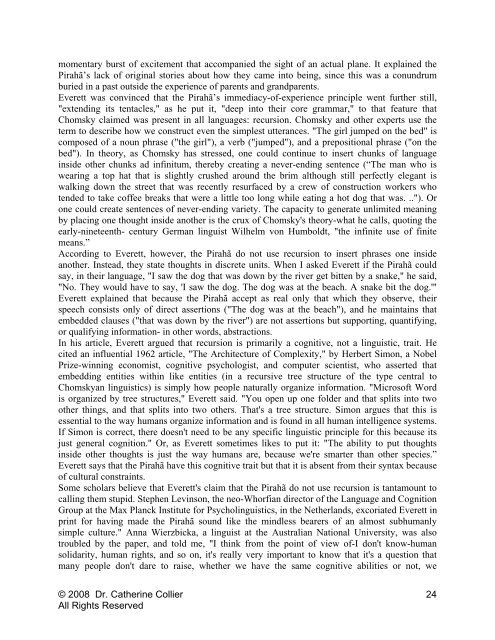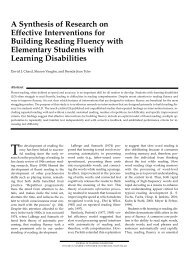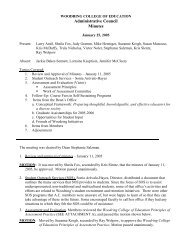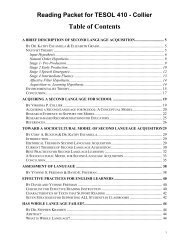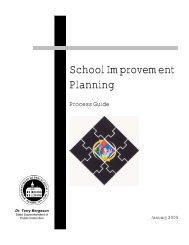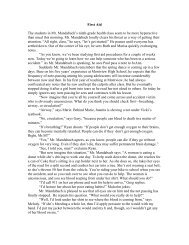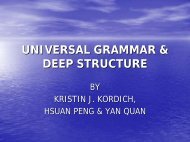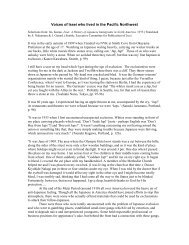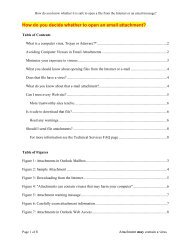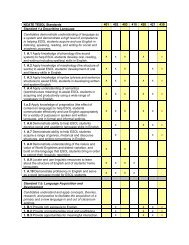momentary burst <strong>of</strong> excitement that accompanied <strong>the</strong> sight <strong>of</strong> an actual plane. It explained <strong>the</strong>Pirahã’s lack <strong>of</strong> original stories about how <strong>the</strong>y came into being, since this was a conundrumburied in a past outside <strong>the</strong> experience <strong>of</strong> parents and grandparents.Everett was convinced that <strong>the</strong> Pirahã’s immediacy-<strong>of</strong>-experience principle went fur<strong>the</strong>r still,"extending its tentacles," as he put it, "deep into <strong>the</strong>ir core grammar," to that feature thatChomsky claimed was present in all languages: recursion. Chomsky and o<strong>the</strong>r experts use <strong>the</strong>term to describe how we construct even <strong>the</strong> simplest utterances. "The girl jumped on <strong>the</strong> bed" iscomposed <strong>of</strong> a noun phrase ("<strong>the</strong> girl"), a verb ("jumped"), and a prepositional phrase ("on <strong>the</strong>bed"). <strong>In</strong> <strong>the</strong>ory, as Chomsky has stressed, one could continue to insert chunks <strong>of</strong> languageinside o<strong>the</strong>r chunks ad infinitum, <strong>the</strong>reby creating a never-ending sentence (“The man who iswearing a top hat that is slightly crushed around <strong>the</strong> brim although still perfectly elegant iswalking down <strong>the</strong> street that was recently resurfaced by a crew <strong>of</strong> construction workers whotended to take c<strong>of</strong>fee breaks that were a little too long while eating a hot dog that was. .."). Orone could create sentences <strong>of</strong> never-ending variety. The capacity to generate unlim<strong>ited</strong> meaningby placing one thought inside ano<strong>the</strong>r is <strong>the</strong> crux <strong>of</strong> Chomsky's <strong>the</strong>ory-what he calls, quoting <strong>the</strong>early-nineteenth- century German linguist Wilhelm von Humboldt, "<strong>the</strong> infinite use <strong>of</strong> finitemeans.”According to Everett, however, <strong>the</strong> Pirahã do not use recursion to insert phrases one insideano<strong>the</strong>r. <strong>In</strong>stead, <strong>the</strong>y state thoughts in discrete units. When I asked Everett if <strong>the</strong> Pirahã couldsay, in <strong>the</strong>ir language, "I saw <strong>the</strong> dog that was down by <strong>the</strong> river get bitten by a snake," he said,"No. They would have to say, 'I saw <strong>the</strong> dog. The dog was at <strong>the</strong> beach. A snake bit <strong>the</strong> dog.'"Everett explained that because <strong>the</strong> Pirahã accept as real only that which <strong>the</strong>y observe, <strong>the</strong>irspeech consists only <strong>of</strong> direct assertions ("The dog was at <strong>the</strong> beach"), and he maintains thatembedded clauses ("that was down by <strong>the</strong> river") are not assertions but supporting, quantifying,or qualifying information- in o<strong>the</strong>r words, abstractions.<strong>In</strong> his ar<strong>ticle</strong>, Everett argued that recursion is primarily a cognitive, not a linguistic, trait. Hec<strong>ited</strong> an influential 1962 ar<strong>ticle</strong>, "The Architecture <strong>of</strong> Complexity," by Herbert Simon, a NobelPrize-winning economist, cognitive psychologist, and computer scientist, who asserted thatembedding entities within like entities (in a recursive tree structure <strong>of</strong> <strong>the</strong> type central toChomskyan linguistics) is simply how people naturally organize information. "Micros<strong>of</strong>t Wordis organized by tree structures," Everett said. "You open up one folder and that splits into twoo<strong>the</strong>r things, and that splits into two o<strong>the</strong>rs. That's a tree structure. Simon argues that this isessential to <strong>the</strong> way humans organize information and is found in all human intelligence systems.If Simon is correct, <strong>the</strong>re doesn't need to be any specific linguistic principle for this because itsjust general cognition." Or, as Everett sometimes likes to put it: "The ability to put thoughtsinside o<strong>the</strong>r thoughts is just <strong>the</strong> way humans are, because we're smarter than o<strong>the</strong>r species.”Everett says that <strong>the</strong> Pirahã have this cognitive trait but that it is absent from <strong>the</strong>ir syntax because<strong>of</strong> cultural constraints.Some scholars believe that Everett's claim that <strong>the</strong> Pirahã do not use recursion is tantamount tocalling <strong>the</strong>m stupid. Stephen Levinson, <strong>the</strong> neo-Whorfian director <strong>of</strong> <strong>the</strong> Language and CognitionGroup at <strong>the</strong> Max Planck <strong>In</strong>stitute for Psycholinguistics, in <strong>the</strong> Ne<strong>the</strong>rlands, excoriated Everett inprint for having made <strong>the</strong> Pirahã sound like <strong>the</strong> mindless bearers <strong>of</strong> an almost subhumanlysimple culture." Anna Wierzbicka, a linguist at <strong>the</strong> Australian National <strong>Un</strong>iversity, was alsotroubled by <strong>the</strong> paper, and told me, "I think from <strong>the</strong> point <strong>of</strong> view <strong>of</strong>-I don't know-humansolidarity, human rights, and so on, it's really very important to know that it's a question thatmany people don't dare to raise, whe<strong>the</strong>r we have <strong>the</strong> same cognitive abilities or not, we© 2008 Dr. Ca<strong>the</strong>rine CollierAll Rights Reserved24
humans." Everett dismissed such criticisms, since he expressly st<strong>ates</strong> in <strong>the</strong> ar<strong>ticle</strong> that <strong>the</strong>unusual aspects <strong>of</strong> <strong>the</strong> Pirahã are not -a result <strong>of</strong> mental deficiency. A Pirahã removed from <strong>the</strong>jungle at birth and brought up in any city in <strong>the</strong> world, he said, would have no trouble learning<strong>the</strong> local tongue. Moreover, Everett pointed out, <strong>the</strong> Pirahã are supremely gifted in all <strong>the</strong> waysnecessary to insure <strong>the</strong>ir continued survival in <strong>the</strong> jungle: <strong>the</strong>y know <strong>the</strong> usefulness and location<strong>of</strong> important plants in <strong>the</strong>ir area; <strong>the</strong>y understand <strong>the</strong> behavior <strong>of</strong> local animals and how to catchavoid <strong>the</strong>m; and can walk into <strong>the</strong> jungle naked, with no tools or weapons, and walk out threeday later with baskets <strong>of</strong> fruit, nuts, and small game. "They can out-survive anybody, any o<strong>the</strong>r<strong>In</strong>dian in this region," he said. "They're very intelligent people. It never would occur to me thatsaying <strong>the</strong>y lack things that Levinson or Wierzbicka predict <strong>the</strong>y should have is calling <strong>the</strong>mmindless idiots.”For Everett, <strong>the</strong> most important reaction to <strong>the</strong> ar<strong>ticle</strong> was Chomsky's. <strong>In</strong> an e-mail to Everett lastApril, Chomsky rejected Everett's arguments that <strong>the</strong> Pirahã’s lack <strong>of</strong> recursion is a strongcounter example to his <strong>the</strong>ory <strong>of</strong> universal grammar, writing, “UG is <strong>the</strong> true <strong>the</strong>ory <strong>of</strong> <strong>the</strong>genetic component that underlies acquisition and use <strong>of</strong> language." He added that <strong>the</strong>re is "nocoherent alternative to UG.” Chomsky declined to be interviewed for this ar<strong>ticle</strong>, but referred meto "Pirahã Exceptionality: A Reassessment," a paper that was co-authored b David Pesetsky, acolleague <strong>of</strong> Chomsky's at M.I.T.; Andrew Nevins, a linguistic at Harvard; and CileneRodrigues, a linguistic at UNICAMP.<strong>In</strong> <strong>the</strong> paper, which posted last month on <strong>the</strong> Web site LingBuzz, a repository <strong>of</strong> ar<strong>ticle</strong>s onChomskyan generative grammar, <strong>the</strong> authors used data from Everett's 1983 Ph.D. dissertation, aswell as from a paper that he published on Pirahã in 1986, to refute his recent claims about <strong>the</strong>language's unusual features- including <strong>the</strong> assertion that <strong>the</strong> Pirahã do not use recursion. Theauthors conceded that, even in <strong>the</strong>se early works, Everett had noted <strong>the</strong> absence <strong>of</strong> certainrecursive structure in Pirahã. (The tribe, Everett wrote in <strong>the</strong> early eighties, does not embedpossessives inside one ano<strong>the</strong>r, as English speakers do when <strong>the</strong>y say, "Tom's uncle's carswindshield..."). Never<strong>the</strong>less, <strong>the</strong>y argued, Everett's early data suggested that <strong>the</strong> Pirahã’s speechdid contain recursive operations.The fact that Everett had collected <strong>the</strong> data twenty-five years ago, when he was a devotee <strong>of</strong>Chomsky's <strong>the</strong>ory, was irrelevant, Pesetsky told me in an e-mail. At any rate, Pesetsky wrote, heand his co-authors detected no sign <strong>of</strong> a particularly Chomskyan perspective" in <strong>the</strong> descriptiveportions <strong>of</strong> Everett's early writings, adding, "For <strong>the</strong> most part, those works are about facts, and<strong>the</strong> categorizing <strong>of</strong> facts."Everett, who two weeks ago posted a response to Pesetsky and his co-authors on LingBuzz, saysthat Chomsky's <strong>the</strong>ory necessarily colored his data-ga<strong>the</strong>ring and analysis. "Descriptive workapart from <strong>the</strong>ory does not exist,” he told me. “We ask <strong>the</strong> questions that our <strong>the</strong>ories tell us toask." <strong>In</strong> his response on LingBuzz, Everett addressed his critics' arguments point by point anddisputed <strong>the</strong> contention that his early work was more reliable than his resent research as a guideto Pirahã. "I would find <strong>the</strong> opposite troubling- i.e., that a researcher never changed <strong>the</strong>ir mind orfound errors in <strong>the</strong>ir earlier work," he wrote. He added, "There are alternatives to <strong>Un</strong>iversalGrammar, and <strong>the</strong> fact that NPR"- Nevins, Pesetsky, and Rodrigues- "insist on characterizing <strong>the</strong>issue as though <strong>the</strong>re were no alternatives, although typical, is ei<strong>the</strong>r ignorant or purposelymisleading."<strong>In</strong> a comment on Everett's paper published in Cultural Anthropology, Michael Tomasello, <strong>the</strong>director <strong>of</strong> <strong>the</strong> Department <strong>of</strong> Developmental and Comparative Psychology at <strong>the</strong> Max Planck<strong>In</strong>stitute for Evolutionary Anthropology, in Leipzig, endorsed Everett's conclusions that culture© 2008 Dr. Ca<strong>the</strong>rine CollierAll Rights Reserved25
- Page 2 and 3: "Those who arrive by age 12 or 13 m
- Page 5: Article I.2 Are Signed Languages "R
- Page 8 and 9: Biological analyses of the status o
- Page 10 and 11: and beyond, speaking and signing ch
- Page 12 and 13: Conclusion: Are Signed Languages Re
- Page 14 and 15: Article I.3 The Interpreter: Has a
- Page 16 and 17: A few weeks earlier, I had called F
- Page 18 and 19: “We struggled even getting to the
- Page 20 and 21: herself by strapping a cassette rec
- Page 22 and 23: In 1998, after nine years as the ch
- Page 26 and 27: can shape core grammar. Because the
- Page 28 and 29: The authors compared animal and hum
- Page 30 and 31: monkey moved. He followed it with h
- Page 32 and 33: delight, fear, laughter, and surpri
- Page 34 and 35: Piipaío in a hut: Pirahã huts typ
- Page 36 and 37: LEP students, and equitable organiz
- Page 38 and 39: 4. Second language development crea
- Page 41 and 42: curriculum or "teaching to the test
- Page 43 and 44: portfolio work was scanned and stor
- Page 45 and 46: experiences of many groups of stude
- Page 47 and 48: While not disagreeing that interpre
- Page 49 and 50: sound educational practice, however
- Page 51 and 52: arises from the efforts to abstract
- Page 53 and 54: Article II.2 Cross-Cultural Communi
- Page 55 and 56: males who can serve as positive rol
- Page 57 and 58: Understanding another culture is a
- Page 59 and 60: Pets and AnimalsWhich animals are v
- Page 61 and 62: to teach standard English is reflec
- Page 63 and 64: Asking personal questions of a pers
- Page 65 and 66: Using Cross Cultural Communication
- Page 67 and 68: Why Do Nonstandard English-Speaking
- Page 69 and 70: Before beginning to teach standard
- Page 71 and 72: • Negative attitudes toward low p
- Page 73 and 74: New standardized tests and assessme
- Page 75 and 76:
Each of the behaviors listed above
- Page 77 and 78:
Article II.3 Hard Work Hypothesis:
- Page 79 and 80:
each point higher in SES, students
- Page 81 and 82:
This case does not provide strong s
- Page 83 and 84:
Article II.4 Language Acquisition a
- Page 85 and 86:
1992, p. XI). These researchers, wh
- Page 87 and 88:
comprehend a word within a specific
- Page 89 and 90:
more to the truthfulness of the chi
- Page 91 and 92:
This idea of “semilingualism” c
- Page 93 and 94:
Article III.1 A Brief Description o
- Page 95 and 96:
take different lengths of time to c
- Page 97 and 98:
example, should involve the same co
- Page 99 and 100:
As with all stages of BICS acquisit
- Page 101 and 102:
Assessment techniques at stage 3 ca
- Page 103 and 104:
different. Therefore, the social di
- Page 105:
integrative motivation. Basically,
- Page 109 and 110:
(Ellis, 1985; Hakuta, 1986). Howeve
- Page 111 and 112:
that sociocultural processes have o
- Page 113 and 114:
Article III.3 How Children Acquire
- Page 115 and 116:
phonetic units (unique to signed la
- Page 117 and 118:
Article III.4 Toward a Sociocultura
- Page 119 and 120:
emember is that the fundamental goa
- Page 121 and 122:
The best practices models can be th
- Page 123 and 124:
By focusing on the dialectic betwee
- Page 125 and 126:
intergenerational wisdom shared by
- Page 127 and 128:
Daily Realities RecappedThe above v
- Page 129 and 130:
traditions. At a time in our histor
- Page 131 and 132:
We will now look at two examples of
- Page 133 and 134:
Speakers communicate fluently, main
- Page 135 and 136:
question the effects of such attitu
- Page 137 and 138:
Article IV.3 Culture Change: Effect
- Page 139 and 140:
and psychological characteristics o
- Page 141 and 142:
Contraryto what wewere expecting, t
- Page 143 and 144:
Article V.1 Assessment in ESL & Bil
- Page 145 and 146:
vocabulary does the student lack?Is
- Page 147 and 148:
whether they are LEP and to provide
- Page 149 and 150:
Fourth, ESL and bilingual program s
- Page 151 and 152:
competent reader/writer. All versio
- Page 153 and 154:
Table 1Comparison of Recent Accultu
- Page 155 and 156:
unilinear model, which measures the
- Page 157 and 158:
an English-only instructional progr
- Page 159 and 160:
Article V.3 Assessment of English L
- Page 161 and 162:
8. Change answers only for a very g
- Page 163 and 164:
Riles, 1979; Jose P. v Ambac, 1983)
- Page 165 and 166:
proficiency is often underestimated
- Page 167 and 168:
Finally, when second language reade
- Page 169 and 170:
for their decisions, noting issues
- Page 171 and 172:
As mentioned above, when the transi
- Page 173 and 174:
ather than generic adjectives and t
- Page 175 and 176:
their imagined points of view. Ther
- Page 177 and 178:
English texts and demonstrate progr
- Page 179:
using inter-district teams). In the


